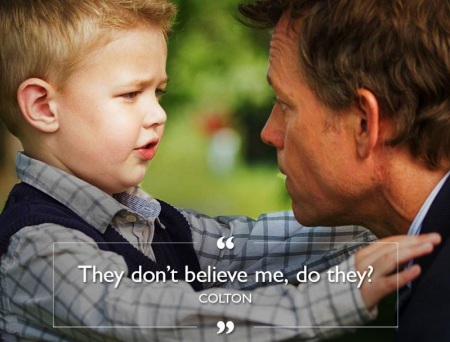Review of the Movie ‘Heaven is For Real’
When an adaptation of a widely recognized book hits the big screen, the anticipation among audiences can become palpable, especially when the source material delves into profound topics such as faith, life after death, and the innocence of childhood. “Heaven is For Real,” a film directed by Randall Wallace and based on the best-selling memoir by Todd Burpo, has generated much discussion since its release. The film presents a poignant exploration of spiritual themes, human emotions, and the relationship between parents and their children, all tied together by the astonishing account of a young boy’s near-death experience.
The Premise
“Heaven is For Real” follows the true story of a young boy named Colton Burpo, played by Connor Corum, who, at the tender age of four, experienced a life-threatening medical emergency requiring emergency surgery. Following the operation, Colton begins to share vivid and fantastical accounts of his experiences while being unconscious. He describes encounters with angels, a visit to Heaven, and meeting loved ones who have passed away, including his grandfather and a sister he never knew existed. His revelations leave his father, Todd Burpo (played by Greg Kinnear), a pastor who is grappling with his faith, both astonished and skeptical.
As Todd and his wife, Sonja (played by Kelly Reilly), navigate Colton’s extraordinary claims, they find themselves confronted with questions about the very nature of life, death, and the existence of Heaven. These discussions unfold against the backdrop of a Christian community steeped in traditional beliefs, setting the stage for both spiritual exploration and familial drama.

Casting and Performances
The film’s cast delivers commendable performances that add depth to the emotional narrative. Greg Kinnear embodies Todd Burpo’s earnestness and vulnerability as he struggles with his skepticism and desire to protect his son. His portrayal is particularly effective in capturing the essence of a father torn between doubt and the love for his child. Kelly Reilly also shines as Sonja, portraying a mother grappling with the fear and uncertainty that comes with witnessing her son’s extraordinary experiences.
Connor Corum’s portrayal of young Colton injects genuine innocence and authenticity into the film. His childlike wonder and earnestness make the character incredibly relatable, allowing audiences to connect deeply with his journey. The supporting cast, including Margo Martindale as a skeptical family friend and Thomas Haden Church as a visually impaired reverend, contribute effectively to the overall narrative, enriching the story with their varied perspectives.
Themes and Messages
At its core, “Heaven is For Real” explores the theme of faith in the face of uncertainty. This is not merely a film about a boy’s vision of Heaven; rather, it is a larger reflection on what it means to believe in something beyond the tangible. The film invites viewers to question their perceptions of life and death and challenges the audience’s understanding of the afterlife. Issues of faith reconciliation come to the forefront as Todd Burpo grapples with his own beliefs while trying to comprehend his son’s experiences.
The movie also delves into the dynamic of familial love and the lengths to which a parent goes to protect their child. Todd’s journey is a reminder of the power of love, the importance of communication, and the challenges faced when confronting difficult truths. The film’s emotional weight is balanced with moments of levity, ensuring that while it engages with heavy themes, it also provides warmth and comfort.

Cinematography and Direction
Randall Wallace’s direction offers a sensitive touch to the narrative, striking a balance between the surreal and the relatable. Wallace, known for his work on films such as “Braveheart” and “We Were Soldiers,” brings an atmospheric quality to the movie. The cinematography by Allen Lee focuses on the intimate details of the Burpo family’s life, capturing both the joyful moments and the challenging times.
With the use of soft lighting and warm color palettes, the film evokes a sense of closeness, reinforcing the idea of family and community. The sequences depicting Colton’s experiences in Heaven are visually engaging, employing special effects that aim to represent Heaven’s beauty and tranquility without descending into cliché or overstated representations of the divine.
Critical Reception
Upon its release in 2014, “Heaven is For Real” garnered mixed reviews from critics. Some praised its heartfelt depiction of faith and family, while others criticized it for its sentimental approach and predictable plot structure. Audience reactions have been largely positive, particularly among those with a predisposition toward faith-based narratives. The film found its audience in church congregations and families looking for a wholesome story that resonates with their beliefs.
While critics might point out certain shortcomings, such as a lack of dramatic tension or an overly simplistic portrayal of complex spiritual questions, the film successfully resonates with many, particularly those who have navigated similar discussions about faith and loss in their own lives.
Conclusion
“Heaven is For Real” invites viewers to reflect on their beliefs and the meaning of life and death through the lens of a child’s experiences. While the movie may not be a cinematic masterpiece in a traditional sense, it accomplishes something profound: it encourages conversations about spirituality, connecting with the divine, and the innocence of childhood wonder.
For those seeking an inspirational narrative that intertwines familial love with spirituality, “Heaven is For Real” serves as an accessible exploration of faith in modern life. Whether approached as a faithful adaptation of the memoir or as a standalone film, it unravels a compelling story that touches on universal themes. It is a reminder that sometimes, in the midst of doubt and fear, belief can illuminate the path towards healing and understanding.

Grant Edward Rayner